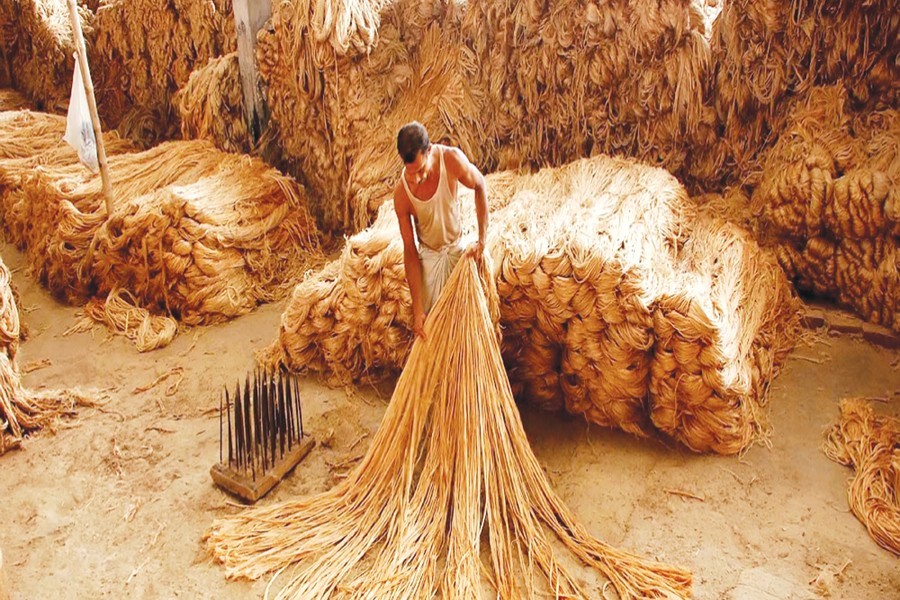The government is reportedly working on a draft jute policy. There is no such policy in the country, which is very much necessary to make the jute sector an important player in the national economy.
It is also a long-felt demand of the jute millers who are demanding formation of a fund similar to the Export Development Fund (EDF).
The jute ministry has started working on a plan to form a Tk 100 billion fund to provide low-cost loans for the development of the nearly $1.0 billion export earning jute sector.
The draft, that has already been prepared, proposed that the government form a 20-year revolving fund based on the budgetary allocation to provide loans to the farmers, traders, industrialists, diversified goods producers and exporters. The draft policy is now at scrutinising stage.
The loans will, according to reports, be disbursed at 5.0 per cent interest and half of the interest payments would come from the state coffer as subsidy. Bangladesh Bank would be given the task of managing the fund. All banks will have the opportunity to enjoy access to the fund under refinancing arrangement.
The main aim of the policy is to provide the ailing jute sector with the opportunities similar to what the garment and leather goods industries enjoy. Also, the traditional technology needs to be modernised as the jute industry is lagging behind in terms of technology.
Mention may be made that the government had formed the EDF back in 1989 to provide low-cost funds to export-oriented sectors-- such as garment and leather-- to buy raw materials from abroad to make exportable goods. Unfortunately, there is no such fund for the jute industry. Without the government's support, the jute industry is unable to thrive.
There is no denying that the jute and jute goods hold the potential to become the next key driver of the economy as the present ones -- garments and remittance -- have little scope to contribute more in the long run. As Bangladesh needs a new growth driver, jute and jute goods can be the main driver soon.
People worldwide are avoiding harmful polythene in their daily lives while entrepreneurs in the country are investing on jute and jute goods to regain its lost glory. Thousands of jobs have been created by small and medium jute mills in Bogura and Jassore running with machinery of Adamjee Jute Mills, which were shut down.
Jute production increased gradually from 6.5 million bales in 2014 to 7.0 million bales last year for better prices ensured by a government rule making its use mandatory in goods packaging.
More than 1.0 billion sacks were additionally produced. Local entrepreneurs expanded the export base increasing the types of jute goods from 135 last year to 240 this year. The government gave out a 20 per cent subsidy on its diversification.
Meanwhile, the finance ministry is set to issue a circular soon recognising jute goods as a product of the processed industry. This is expected to help exporters avail the incentive on exports like other agro-processed goods. The government recognised jute goods as a product of the agro-processing sector two years ago. But the finance ministry has not given the recognition as yet. As a result, exporters are not getting the incentives.
There is a need for producing skilled workforce as every year a lot of foreign currency is spent to hire foreign experts to run textiles and jute sectors. What is true about the jute goods is that the country gets Tk 1.0 on selling a garment item at Tk 4.0 but retains the whole amount in case of jute. Bangladesh expects a maund or around 40 kilogrammes of jute to sell for Tk 3,000 by 2021.
Jute traders get bank loans at 20 per cent interest while other exporters can borrow from the EDF at only 2.0 per cent interest. However, the fact remains they need investment from either the government or the private sector to commercially produce paper from jute. Moreover, by making viscose and paper pulp from jute at home, Bangladesh can save Tk 17 billion while earning $7.0 billion from jute and jute goods exports a year.
The country has immense potential to become the main supplier of jute to the global car industry, which uses the natural fibre to manufacture the interiors of vehicles. The global car industry needs about 100,000 tonnes of jute a year, of which 12,000 tonnes come from Bangladesh.
Bangladesh started supplying jute to high-end car brands like BMW, Mercedes-Benz, Volvo and Audi in early 2000s. Previously, the car industry used glass fibre to manufacture the interiors. But glass fibre is not recyclable or biodegradable. As such, the search for a green alternative began in 1994. Jute emerged as the frontrunner. Surprisingly, Bangladesh supplies almost all the required jute fibres used by the high-end car brands.
These renowned brands have, of late, started making different environment-friendly components for cars using jute. As the country's jute is much admired for its high fibre quality, it could have supplied all the jute required by the car industry.
But in reality, the country is failing to keep pace with the growth in supply. It remains stagnant at 5.0 per cent over the last many years. The government's unpredictable jute export policy is squarely to blame. It stops the export of jute without any prior notice. As a result, the car manufacturers can't fully rely on Bangladeshi jute.
For instance, a few years ago, the government imposed a ban on the export of raw jute from Bangladesh, which left many car manufacturers facing a shortage of the natural fibre. The German car brand, BMW, wrote to the Bangladesh government and after hard negotiations, the export ban was lifted.
The government has, for long, been favouring the garments sector. It should now give similar policy support on adding value to jute and jute goods and make non-performing jute mills profitable by keeping them running.


